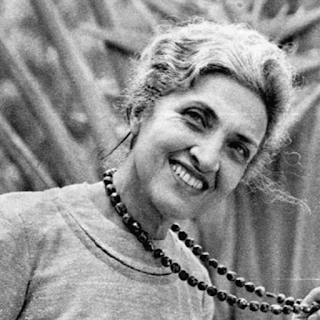Biography.
Adélia Luzia Prado Freitas (born 13 December 1935) is a Brazilian writer and poet. Her poetry was "discovered" in 1976, when at the age of 40 she sent a small collection of her poems to poet Affonso Romano de Sant’Anna. De Sant'Anna passed her work on to the Brazilian modernist poet Carlos Drummond de Andrade, who read it and proclaimed in his weekly newspaper column. In describing her work, Robert Hass said "Brazil has produced what might seem impossible: a really sexy, mystical, Catholic poet."Teaching
My mother thought study
the grandest thing in the world.
It is not.
The grandest thing in the world is feeling.
That night, father working overtime,
she said to me:
"Poor man, such an hour, and still hard at work."
She prepared bread and coffee, left a saucepanful of hot water on the
stove.
No mention was made of love.
That luxury word.
Translated by David Coles
Guide
Poetry will save me.I feel uneasy saying this, since only Jesus
is Savior, as a man inscribed
(of his own free will)
on the back of the souvenir crucifix he brought home
from a pilgrimage to Congonhas.
Nevertheless, I repeat: Poetry will save me.
It's through poetry that I understand the passion
He had for us, dying on the cross.
Poetry will save me, as the purple of flowers
spilling over the fence
absolves the girl her ugly body.
In poetry the Virgin and the saints approve
my apocryphal way of understanding words
by their reverse, my decoding the town crier's message
by means of his hands and eyes.
Poetry will save me. I won't tell this to the four winds,
because I'm frightened of experts, excommunication,
afraid of shocking the fainthearted. But not of God.
What is poetry, if not His face touched
by the brutality of things?
Translated by Ellen Watson
The Mystical Rose
The first timeI became conscious of form,
I said to my mother:
“Dona Armanda has a basket in her kitchen
where she keeps tomatoes and onions”
and began fretting that even lovely things
eventually spoil,
until one day I wrote:
“It was here in this room that my father died,
here that he wound the clock
and rested his elbows
on what he thought was the windowsill
but was the threshold of death.”
I understood that words grouped like that
made it possible to live without
the things they describe,
that my father was returning, indestructible.
It was as if someone had painted a picture
of Dona Armanda’s basket and said:
“Now you can eat the fruit.”
So, there is order in the world!
—where does it come from?
And why does order, which is joy itself,
and bathes in a different light
than the light of day,
make the soul sad?
We must protect the world from time’s corrosion,
cheat time itself.
And so I kept writing: “My father died in this room…
Night, you can come on down,
your blackness can’t erase this memory.”
That was my first poem.
Translated by Alison McGhee





